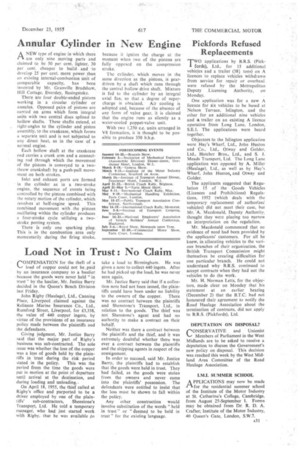Load Not in Trust : No Claim
Page 33

If you've noticed an error in this article please click here to report it so we can fix it.
COMPENSATION for the theft of a ‘.--• load of copper could not be,paid by an insurance company to a haulier • because the goods were never held "in trust" by the haulier, Mr. Justice Barry decided in the Queen's Bench Division last Friday.
John Rigby (Haulage), Ltd., Canning Place, Liverpool. claimed against the Reliance Marine Insurance Co., Ltd., Rumford Street, Liverpool, for £3,338, the value of 440 copper ingots, by virtue of the provisions of an insurance policy made between the plaintiffs and the defendants.
Giving judgment, Mr. Justice Barry said that the major part of Rigby's business was sub-contracted. The sole issue was whether the loss of the copper was a loss of goods held by the plaintiffs in trust during the risk period
stated in the policy. This was the period from the time the goods were put in motion at the point of departure until arrival at the destination, and during loading and unloading.‘ On April 18, 1955, the thief called at Rigby's office and purported to be a driver employed by one of the plain tiffs' sub-contractors, Shenstone's Transport, Ltd. He told a temporary manager, who had just started work with Rigby, that he was available to
take a load to Birmingham. He was given a note to collect 440 ingots, After he had picked up the load, he was never seen again.
Mr. Justice Barry said that if a collection note had not been issued, the plaintiffs could have been under no liability to the owners of the copper. There was no contract between the plaintiffs and Shenstone's Transport, Ltd., in relation to the goods. The thief was not Shenstone's agent and had no authority to make a contract on their behalf.
Neither was there a contract between the plaintiffs and the thief, and it was extremely doubtful whether there was ever a contract between the plaintiffs and the shipping agents in respect of the consignment.
In order to succeed, said Mr. Justice Barry, the plaintiffs had to establish that the goods were held in trust. They had failed, as the goods were stolen from the owners and never came into the plaintiffs' possession. The defendants were entitled to insist that the loss must be shown to fall within the policy.
Any other construction would involve substitution of the words "held in trust" or "deemed to be held in trust" for the existing language.




























































































